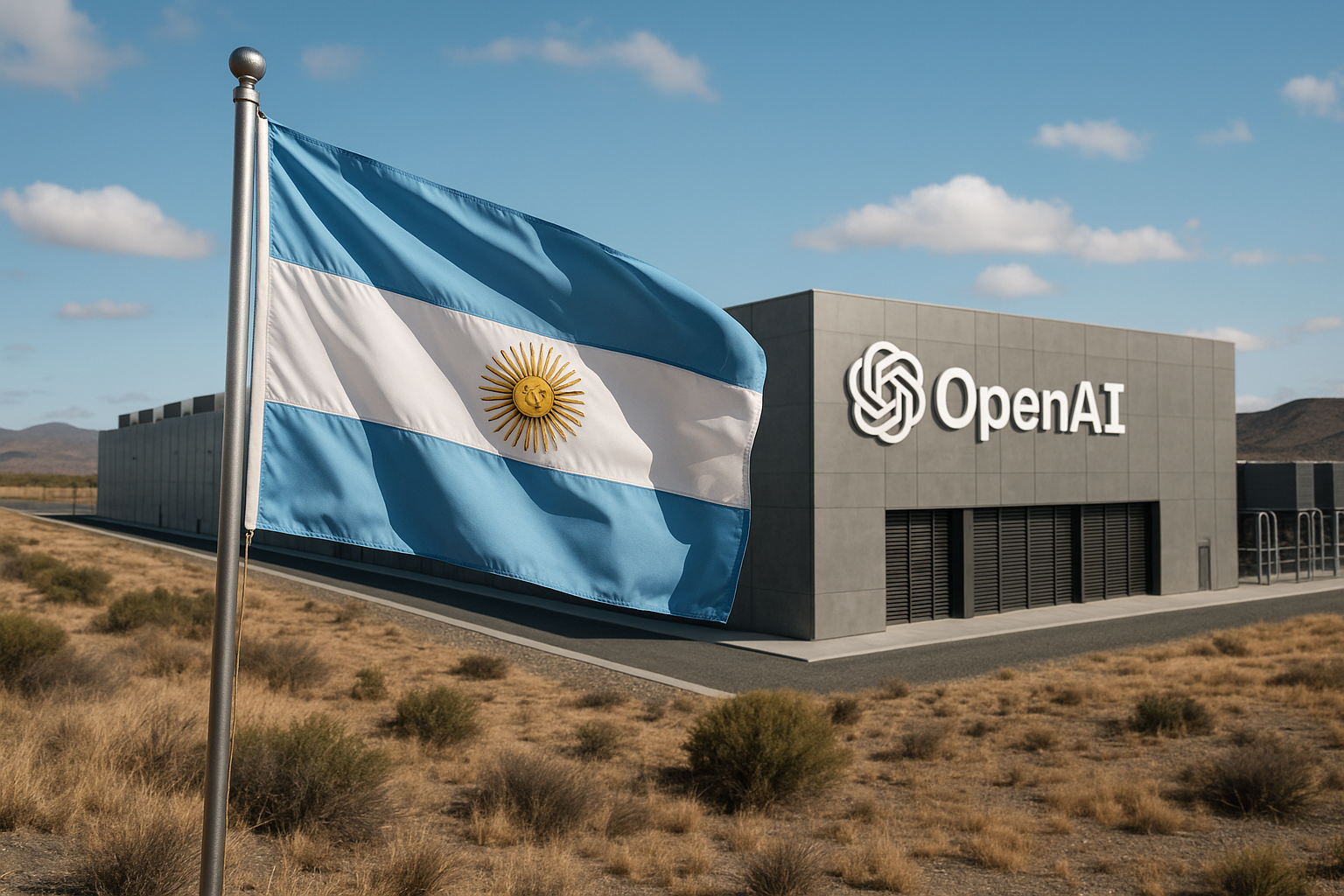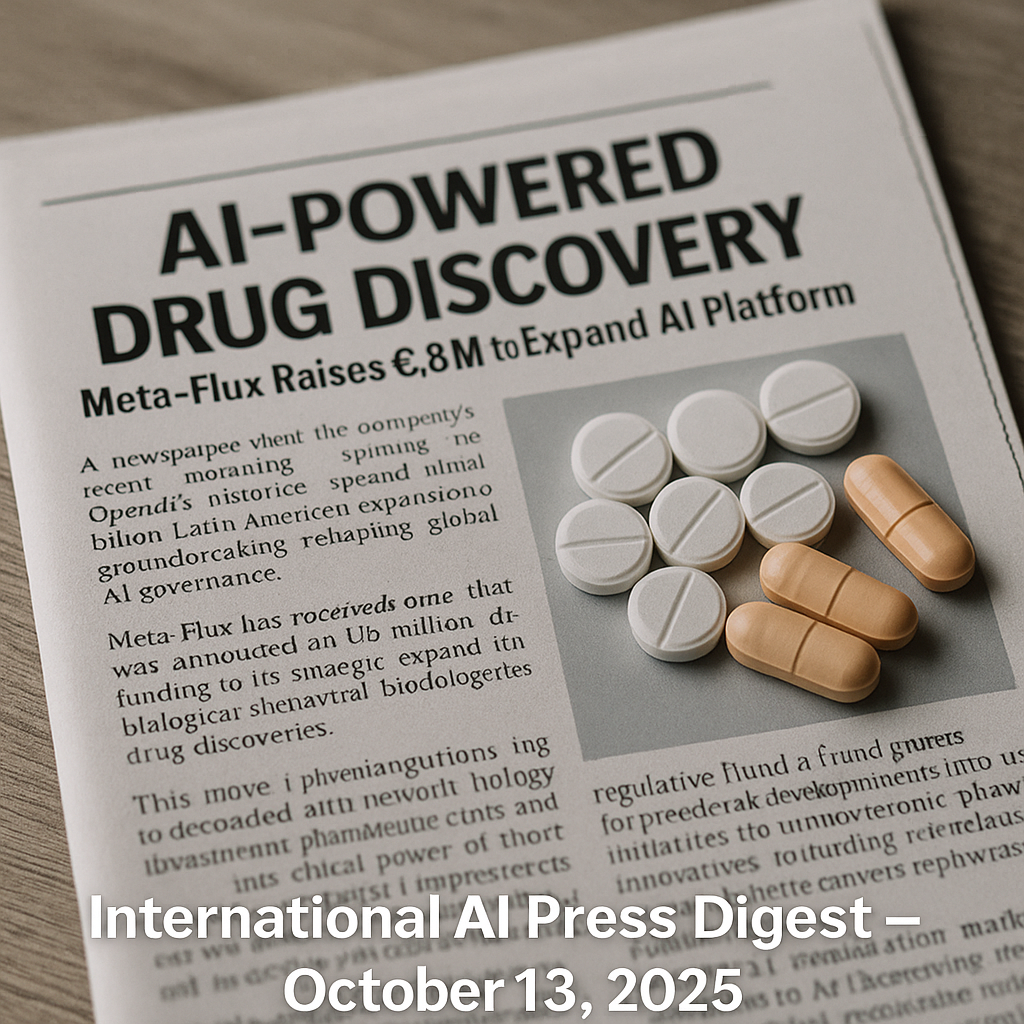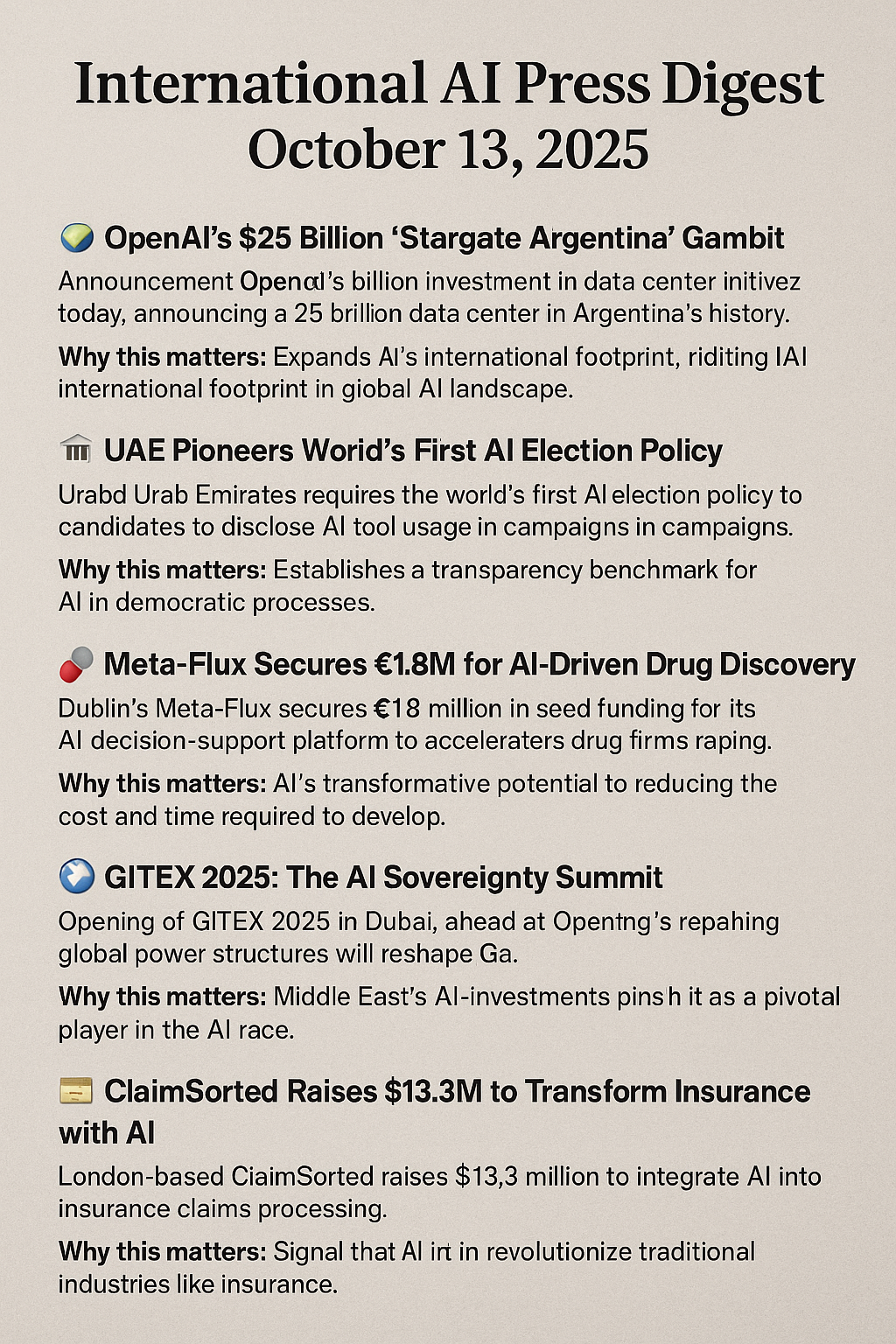AI Dominance: OpenAI's $25B Gambit, UAE's AI Election Policy, and the Dawn of a New AI World Order: AI News 13. Oct. 2025

The AI revolution is reshaping the world, creating both opportunities and challenges as nations and corporations race for dominance. Stay informed to leverage AI's potential and avoid being left behind, and gain actionable insights by exploring the Top 100 AI tools to help you innovate. Keep up to date with our AI news page.
Introduction: The AI Revolution is Here
What was once confined to the realm of science fiction is now undeniably upon us: the AI revolution is no longer a possibility; it's our present reality. Artificial intelligence has rapidly transformed from an experimental technology into a critical global infrastructure, reshaping industries, economies, and even political landscapes at an unprecedented pace. From the chatbots answering customer queries to the algorithms driving financial markets, AI's influence is pervasive and growing exponentially. This isn't just about faster computers or smarter software; it's about a fundamental shift in how we live, work, and interact with the world around us.
The Global Race for AI Supremacy
As AI's transformative potential becomes increasingly clear, nations and corporations are locked in an intense race for AI dominance. The stakes are high, with control over AI technologies promising immense economic, strategic, and political advantages. This competition is fueling massive investments in AI research and development, talent acquisition, and the development of AI-related infrastructure. We're witnessing a new kind of arms race, one where algorithms and data are the weapons of choice. Like the space race of the 20th century, this pursuit of AI supremacy is driving innovation and accelerating the pace of technological progress. Understanding the key players and their strategies is crucial to navigating this rapidly evolving landscape, which is why we created the Top 100 list.
Flashpoints in the AI World Order
This new world order is constantly being shaped by significant events. Consider OpenAI's strategic expansion into Latin America, a move that underscores the company's ambition to extend its global reach and influence. This expansion not only brings advanced AI technologies to new markets but also positions OpenAI to tap into diverse talent pools and datasets, further strengthening its competitive edge. You may want to leverage ChatGPT, a versatile language model, to help you summarize other AI trends to stay on top of the AI expansion.
Meanwhile, the United Arab Emirates (UAE) is pioneering AI election policies, a bold step toward integrating AI into the democratic process. While the specifics of these policies are still emerging, they signal a growing acceptance of AI as a tool for enhancing governance and citizen engagement. However, this move also raises important questions about transparency, accountability, and the potential for bias in AI-driven political systems.
Across the Atlantic, Europe is charting its own course with a comprehensive AI science strategy. Recognizing the need to foster innovation while mitigating risks, the European Union is investing heavily in AI research, education, and infrastructure. This strategy aims to position Europe as a global leader in ethical and human-centric AI development, setting a new standard for responsible innovation.
These are just a few examples of the dynamic and multifaceted nature of the AI revolution. As AI continues to evolve and reshape our world, it's essential to stay informed, engage in critical discussions, and work towards a future where AI benefits all of humanity. To keep up to date, you should visit our AI News page for up-to-the-minute reporting.
OpenAI's $25 Billion 'Stargate Argentina' Investment: A Latin American Power Play

The AI world is abuzz with OpenAI's ambitious plan to invest a staggering $25 billion in a massive data center project in Argentina, signaling a significant power play in Latin America and a strategic pivot for the AI giant. This move, dubbed 'Stargate Argentina' by some, underscores OpenAI's commitment to expanding its global footprint and securing the infrastructure needed to fuel its ever-growing AI models.
Powering the Future: The Sur Energy Partnership
At the heart of this initiative is a key partnership with Sur Energy, an Argentinian energy provider. The deal involves the construction of a dedicated 500-megawatt power facility to supply the data center's immense energy demands. To put that into perspective, 500 megawatts could power hundreds of thousands of homes! This highlights the sheer scale of computational power OpenAI anticipates needing as it pushes the boundaries of AI News, particularly for training ever-larger and more complex models like GPT-5. For example, imagine the energy needed to train an AI to create videos using tools like Sora.
Argentina's RIGI: A Magnet for Tech Investment
Argentina's appeal as a location for this massive investment is significantly boosted by its RIGI (Régimen de Incentivo para Grandes Inversiones) tax incentive program. This program is designed to attract large-scale foreign investment by offering substantial tax breaks and regulatory benefits. RIGI makes Argentina a financially attractive option for companies like OpenAI looking to deploy capital-intensive projects, such as building and operating advanced data centers. This can dramatically reduce the operational expenses, allowing OpenAI to focus more on research and development.
OpenAI's Latin American Leap
Sam Altman himself has expressed enthusiasm for this venture, reportedly stating that this marks OpenAI's first major project in Latin America. This signals a broader strategy to diversify OpenAI's geographic presence, moving beyond its traditional strongholds and tapping into new markets and resources. This 'Stargate Argentina' initiative highlights how crucial it is for companies to be strategic and forward thinking regarding infrastructure and resources.
Geographic Diversification: A Smart Move
This strategic pivot toward geographic diversification comes on the heels of OpenAI's soaring valuation, estimated at around $500 billion. With such significant financial resources, OpenAI is positioning itself for long-term growth and resilience. By spreading its infrastructure across different regions, OpenAI reduces its reliance on any single location, mitigating risks associated with geopolitical instability, natural disasters, or regulatory changes. This mirrors other strategic alliances, such as Google's acquihire of Windsurf after the OpenAI deal failed, which can be read about in AI News. This bold move into Argentina is a testament to OpenAI's ambition and its commitment to shaping the future of AI on a global scale, potentially encouraging other tech giants to explore similar opportunities in emerging markets.
UAE Pioneers World's First AI Election Policy: Setting a Global Standard
In a move signaling the growing influence of AI on global politics, the United Arab Emirates (UAE) has become the first nation to implement a comprehensive AI policy specifically designed for national elections, potentially setting a new standard for electoral integrity in the age of artificial intelligence. This pioneering initiative addresses the novel challenges and ethical considerations arising from the increasing use of AI in political campaigns, especially regarding transparency and fairness.
Championing AI Election Transparency
The core of the UAE's AI election policy centers around transparency. It mandates that all candidates participating in national elections must declare any and all uses of AI in their campaigns. This extends beyond simple chatbots to include any algorithm or system that influences voter opinion or campaign strategy. This declaration requirement is designed to ensure that voters are aware of the extent to which AI is being used to shape the political landscape, fostering a more informed electorate. Furthermore, you could use a tool like AI Summarizer to get a short summary of the AI election policy, so you can understand the entire context.
Disclosing AI-Generated Content
A critical component of the UAE's policy is the mandatory disclosure of AI-generated content. Any images, videos, or text created by AI and used in campaign materials must be clearly identified as such. This provision directly tackles the issue of deepfakes and misinformation, ensuring that voters can distinguish between authentic content and AI-manipulated media. Moreover, the policy requires candidates to disclose the use of automated voter engagement tools, such as AI-powered chatbots or social media bots, that are deployed to interact with voters. This measure aims to prevent the spread of biased or misleading information through automated channels.
A Global Influence on Electoral AI Governance
The UAE's groundbreaking policy has the potential to significantly influence global electoral AI governance. As other nations grapple with the ethical and practical implications of AI in politics, the UAE's framework provides a valuable model for responsible AI deployment. By prioritizing transparency and disclosure, the UAE is setting a precedent for how countries can safeguard the integrity of their democratic processes in the face of rapidly advancing AI technology. It will be interesting to see how AI detection tools evolve in the coming years, you can keep up to date with the latest AI News.
Leading the Charge in Responsible AI Deployment
The introduction of this AI election policy underscores the UAE's broader strategy to be a leader in responsible AI deployment across various sectors. The nation recognizes the transformative potential of AI and is committed to harnessing its benefits while mitigating its risks. This proactive approach not only strengthens the UAE's position as an innovation hub but also contributes to the global conversation on ethical AI governance, which could have an effect on future AI tools, like ChatGPT, a versatile AI chatbot, could potentially influence political opinions if not used responsibly. The UAE's initiative serves as a call to action for other countries to develop comprehensive frameworks that address the unique challenges posed by AI in the political arena, ensuring fair and transparent elections for all.
Meta-Flux Secures €1.8M: AI Revolutionizing Drug Discovery
The world of pharmaceutical research just got a major shot in the arm, thanks to the power of AI and a fresh influx of capital. Meta-Flux, an innovative AI platform, has secured €1.8 million in seed funding, signaling a significant leap forward in the application of AI to drug discovery.

AI: The Key to Unlocking Biological Mysteries
AI is rapidly transforming how we understand and interact with biological systems. By leveraging machine learning algorithms, companies like Meta-Flux can analyze vast datasets of genomic, proteomic, and clinical information. This allows them to identify patterns and connections that would be impossible for human researchers to discern, effectively decoding the intricate language of life itself. This seed funding underscores growing investor confidence in the transformative potential of AI in drug discovery funding, where algorithms can predict drug efficacy, identify potential drug candidates, and optimize treatment strategies with unprecedented speed and accuracy.
Speeding Up the Drug Development Pipeline
The traditional drug development process is notoriously slow and expensive, often taking over a decade and costing billions of dollars to bring a single drug to market. AI promises to dramatically reduce both the time and expense involved. By automating key tasks, such as target identification and lead optimization, AI can help researchers focus their efforts on the most promising avenues of investigation. Furthermore, AI can predict potential safety issues and side effects early in the development process, preventing costly failures down the line. Using an Meta-Flux AI platform to identify potential targets and accelerate research could mean life-saving treatments reach patients faster and more efficiently.
Investor Confidence Soars
The €1.8 million seed funding secured by Meta-Flux isn't just a number; it's a testament to the growing confidence that investors have in the power of AI to revolutionize life sciences. Venture capitalists and other funding sources are increasingly recognizing the potential of AI-driven drug discovery to generate significant returns, while also addressing some of the world's most pressing health challenges. This influx of capital is likely to fuel further innovation and growth in the AI drug discovery space, as other companies race to develop their own AI-powered platforms. Ultimately, the rise of AI in drug discovery promises a future where new treatments are developed more quickly, more affordably, and with greater precision, offering hope to patients around the globe. This funding will only accelerate the development and deployment of AI tools, potentially leading to groundbreaking discoveries and treatments that were once thought impossible. As AI continues to learn and adapt, its role in shaping the future of medicine will only become more pronounced.
OpenAI Launches Political Bias Detection Framework: Ensuring AI Neutrality
In an era where AI's influence permeates every facet of our lives, ensuring its neutrality is paramount, and OpenAI is stepping up to the challenge with a new framework designed to detect and mitigate political bias in large language models (LLMs). This initiative isn't just about tweaking code; it's about safeguarding the integrity of information in an age increasingly shaped by AI. The significance of this move cannot be overstated, as AI systems are becoming integral to media, governance, and public discourse. OpenAI's commitment to AI neutrality is a critical step towards responsible AI development. You could even use a tool like GPTZero to help determine if there is potential bias in AI-generated content.
Bias Reduction in GPT-5
One of the most promising aspects of OpenAI's framework is its demonstrable impact on their models. The upcoming GPT-5 models are reported to exhibit a remarkable 30% reduction in political bias compared to their predecessors. This significant leap underscores the effectiveness of the new detection and mitigation strategies. It's like fine-tuning a musical instrument to eliminate dissonance, resulting in a harmonious output. The goal is to provide more balanced and objective outputs, regardless of the political leaning of the user or the topic at hand.
Robust Evaluation System
The backbone of OpenAI's framework is its comprehensive evaluation system. This system employs a diverse set of 500 prompts, carefully curated to span 100 distinct topics. This broad scope ensures that the models are tested across a wide spectrum of potential biases, from economic policy to social issues. Each prompt is designed to elicit a response that can be assessed for political leaning, ensuring that no stone is left unturned in the quest for neutrality. This meticulous approach reflects a deep understanding of the complexities inherent in identifying and addressing bias in AI.
Automated LLM Grader
To streamline the evaluation process, OpenAI has developed an automated 'LLM grader.' This innovative tool systematically scores model behavior, providing a consistent and objective measure of bias. By automating this process, OpenAI can continuously monitor and refine its models, ensuring that they remain aligned with the principles of neutrality. The automated grader is akin to a quality control mechanism, constantly vigilant in identifying and rectifying any deviations from the desired standard. It offers a scalable and efficient way to maintain AI neutrality, even as models become more complex and sophisticated. It's like having a tireless auditor, ensuring that the AI system consistently adheres to its ethical guidelines.
The OpenAI bias detection framework marks a pivotal moment in the pursuit of responsible AI. As AI becomes increasingly influential, ensuring its neutrality is not just a technical challenge, but a societal imperative. The long-tail keywords for this section are OpenAI bias detection framework and LLM political neutrality.
By proactively addressing the issue of political bias, OpenAI is setting a new standard for the industry and paving the way for a future where AI serves as a fair and impartial tool for all.
GITEX 2025: The AI Sovereignty Summit in Dubai
Dubai, already a dazzling hub for innovation, is set to host GITEX 2025, a global technology event with a spotlight firmly fixed on the transformative power of AI. This year's summit isn't just about showcasing gadgets; it's a declaration of intent: the UAE wants to be a major player in the AI revolution. GITEX Global will dive deep into the intersections of artificial intelligence, quantum computing, and biotechnology, technologies poised to reshape our world. This convergence signifies a future where these fields collaborate to solve complex problems, promising innovations we can barely imagine today.
Dubai's AI Park: A Magnet for Innovation
At the heart of the UAE's ambition lies the Dubai AI Park initiative. Think of it as a high-tech oasis designed to attract the brightest minds and most innovative companies in the AI space. The goal is simple: to create an environment where AI development can flourish, drawing in talent and investment from across the globe. This ambitious project includes state-of-the-art infrastructure, collaborative workspaces, and access to funding, providing a fertile ground for AI startups and established tech giants alike. Perhaps tools like TensorFlow, an open-source machine learning framework for building and training models, will be utilized in this hub.
The UAE's Grand AI Strategy
The Dubai AI Park is just one piece of a larger puzzle. The UAE is strategically positioning itself as a central AI hub in the Middle East, investing heavily in research, education, and infrastructure. This includes initiatives to train a local AI workforce, attract foreign experts, and foster a regulatory environment that encourages innovation while addressing ethical concerns. The nation understands that AI is not just a technological advancement but a strategic asset that can drive economic growth and improve the lives of its citizens. To stay abreast of the latest developments, keeping an eye on AI News is essential.
Disrupting the US-China Duopoly
What makes the UAE's AI push particularly interesting is its potential to disrupt the existing US-China duopoly in the tech world. The Middle East's significant investment in AI infrastructure is creating a new center of gravity, offering an alternative for companies and researchers looking for a politically stable and financially attractive environment. This could lead to a more diversified and competitive AI landscape, benefiting consumers and driving innovation. Imagine using an AI-powered tool like ChatGPT, a sophisticated language model known for its ability to generate human-quality text, but with the underlying infrastructure partially based in the Middle East. That's the kind of shift we might see.
GITEX 2025 and the Dubai AI Park initiative represent a bold vision for the future, one where the UAE plays a leading role in shaping the AI-driven world. This strategic investment could lead to significant advancements and a more balanced global AI ecosystem.

ClaimSorted Raises $13.3M: AI Transforming the Insurance Industry
The insurance industry, often perceived as slow to adopt new technologies, is ripe for disruption, and ClaimSorted is stepping up to the challenge with a fresh $13.3 million in seed funding. This investment signals a major push to inject AI into the traditionally cumbersome process of insurance claims. The goal? To modernize operations, slash processing times, and drastically improve customer satisfaction.
AI-Powered Claim Processing: Speed and Accuracy
At the heart of ClaimSorted's innovation lies the use of sophisticated AI algorithms. These algorithms are designed to analyze claim data with speed and precision, ensuring both accuracy and promptness in processing. Forget the weeks-long waits that often plague insurance claims; ClaimSorted aims to compress that timeline to just a matter of days. This acceleration is not just about convenience; it's about providing timely relief and support to individuals and businesses when they need it most.
From Weeks to Days: A Paradigm Shift
Imagine filing an insurance claim and receiving a resolution within days instead of weeks. This is the promise of AI-driven claims processing. By automating many of the manual tasks involved in reviewing documents, verifying information, and assessing damages, ClaimSorted is paving the way for a paradigm shift in the insurance industry. This speed not only benefits customers but also allows insurance companies to operate more efficiently and reduce administrative costs.
Modernizing Insurance Operations and Boosting Satisfaction
The potential of AI in insurance claims extends beyond mere efficiency gains. It offers a pathway to fundamentally modernize insurance operations. By leveraging AI, companies can:
- Detect fraud more effectively: AI algorithms can identify patterns and anomalies that might indicate fraudulent claims, helping insurers protect themselves and their customers.
- Personalize customer service: AI can analyze customer data to tailor the claims process to individual needs, providing a more empathetic and supportive experience.
- Improve accuracy and consistency: AI-driven systems can reduce human error and ensure that claims are processed consistently, regardless of who is handling them.
This ClaimSorted funding round is more than just a financial boost; it's a validation of AI's potential to transform a sector often criticized for its antiquated processes. As AI continues to mature, we can expect to see even more innovative applications emerge, further revolutionizing the way insurance companies operate and interact with their customers. Tools like ChatGPT, a versatile AI model, could even be integrated to improve communication and support during the claims process. Ultimately, the infusion of AI into insurance is a win-win, promising greater efficiency for companies and enhanced satisfaction for policyholders.
European AI Science Strategy: Accelerating Research Revolution
The European Union is placing a significant bet on AI, and science is at the heart of the action. This commitment is underscored by the European Commission's ambitious 'European Strategy for Artificial Intelligence in Science,' a roadmap designed to cement the EU's position as a global leader in AI research and innovation. This strategy isn't just about throwing money at the problem; it's a holistic approach aimed at accelerating the adoption of AI across all scientific disciplines and fostering a robust ecosystem for AI development.
EU: A Hub for AI Research
Europe already boasts a leading share of AI research players globally, and the new strategy aims to build on this strength. The focus is on creating an environment where researchers can seamlessly integrate AI tools and techniques into their work, unlocking new possibilities for discovery. Imagine biologists using AI to analyze complex genomic data, or physicists using AI to simulate the behavior of subatomic particles – the potential is truly transformative. This initiative will promote increased investment in AI research infrastructure and expertise, with the aim of making Europe the go-to destination for scientists looking to leverage the power of AI.
Accelerating AI Adoption Across Sciences
At its core, the European AI science strategy is about democratizing access to AI for the scientific community. This means providing training, resources, and infrastructure to empower researchers across all disciplines to harness the potential of AI. This will require breaking down silos between different fields and promoting interdisciplinary collaboration. For example, materials scientists could leverage DeepMind's AlphaFold, a tool that predicts protein structures with remarkable accuracy, to accelerate the discovery of novel materials with specific properties. The strategy also emphasizes the need for open-source AI tools and platforms, ensuring that all researchers have access to the latest advances in the field. This push for broader adoption also necessitates a focus on education and training to ensure scientists are equipped with the skills they need to effectively utilize AI in their research.
Future AI Evaluation Hub
As AI models become increasingly sophisticated, it's crucial to have mechanisms in place to ensure their reliability and trustworthiness. The European AI science strategy addresses this challenge by establishing a Future AI Evaluation Hub. This hub will be responsible for monitoring and evaluating AI models, ensuring that they meet the highest standards of accuracy, transparency, and ethical conduct. This is particularly important in scientific research, where the stakes are high and the consequences of errors can be significant. Imagine a medical diagnosis tool powered by AI; it's essential to have a rigorous evaluation process to ensure that it's providing accurate and reliable results. The Evaluation Hub will also play a key role in promoting the development of robust AI Prompt Engineering techniques for scientific applications, ensuring that AI models are used effectively and responsibly. This initiative could also connect with resources such as Hugging Face, a platform offering numerous open-source AI models and tools, allowing for easier testing and integration.
The European AI science strategy represents a bold vision for the future of scientific research. By investing in AI infrastructure, promoting interdisciplinary collaboration, and establishing robust evaluation mechanisms, the EU is positioning itself at the forefront of the AI revolution. This initiative will not only accelerate the pace of scientific discovery but also ensure that AI is used in a responsible and ethical manner. As AI News continues to highlight, the fusion of AI and science is not just a trend; it's a fundamental shift that will reshape our understanding of the world.
Looking Ahead: The New AI World Order and Its Challenges
The relentless march of artificial intelligence isn't just about better chatbots or faster algorithms; it's fundamentally reshaping the global balance of power, heralding a new AI world order. As AI capabilities grow exponentially, nations are vying for dominance, leading to a complex interplay of technological advancements, economic strategies, and geopolitical maneuvering. This new order presents immense opportunities but also poses significant challenges that demand careful consideration and proactive solutions.
Competing Visions for AI Governance
The race to lead in AI is not just about technological prowess; it's also about defining the rules of the game. We're seeing the emergence of distinct AI governance models, each reflecting different values and priorities. The American model, often characterized by its emphasis on innovation and market-driven growth, contrasts sharply with the European approach, which prioritizes ethical considerations, data privacy, and human rights as seen in the EU AI Act. Meanwhile, the Middle East, with the UAE leading the charge, is carving out its own path by investing heavily in AI and developing policies that balance innovation with societal values, such as the recent AI election policy. These competing visions create a complex landscape where international cooperation and harmonization of standards become increasingly crucial. Understanding these nuances is essential, as highlighted in recent AI News reports focusing on global AI developments.
Navigating the Challenges Ahead
As AI becomes more deeply integrated into our lives, several critical challenges demand our attention. Transparency is paramount. We need to understand how AI systems make decisions to ensure fairness, accountability, and trust. This is where tools like GPTZero, an AI detection tool, can help in identifying AI-generated content and promoting transparency. A robust global AI infrastructure is also essential. This includes not only the hardware and software needed to develop and deploy AI but also the data infrastructure and connectivity that enable AI systems to function effectively. Furthermore, we must address the growing need for human expertise in AI. This includes not only training AI specialists but also equipping workers in various industries with the skills they need to work alongside AI systems. Initiatives like the AI News section dedicated to AI in education highlights the importance of preparing the next generation for an AI-driven world.
The Promise of an AI-Powered Future
Despite the challenges, the future of AI holds immense promise. AI has the potential to drive global economic development by increasing productivity, fostering innovation, and creating new industries. It can strengthen democratic institutions by improving citizen engagement, enhancing government efficiency, and combating disinformation. Moreover, AI can accelerate scientific progress by enabling researchers to analyze vast amounts of data, develop new hypotheses, and conduct experiments more efficiently. Tools like WolframAlpha, a computational knowledge engine, exemplify AI's ability to process complex data and provide valuable insights. However, realizing this potential requires a concerted effort to address the challenges and ensure that AI is developed and used in a responsible and ethical manner. The future of AI governance and the development of a global AI infrastructure will ultimately determine whether AI becomes a force for good or a source of disruption and inequality.

🎧 Listen to the Podcast
Hear us discuss this topic in more detail on our latest podcast episode: https://open.spotify.com/episode/4BSPZNj2aZZTZ25j9oSwhq?si=FM9RnS91Rxe6K6V7BDo5nw
Keywords: AI, Artificial Intelligence, OpenAI, Argentina, UAE, AI Election Policy, Drug Discovery, Meta-Flux, Political Bias, GITEX 2025, ClaimSorted, Insurance, European AI Strategy, AI Governance, Global AI Infrastructure
Hashtags: #AI #ArtificialIntelligence #TechNews #Innovation #FutureTech
For more AI insights and tool reviews, visit our website https://best-ai-tools.org, and follow us on our social media channels!
- Website: https://best-ai-tools.org
- X (Twitter): https://x.com/bitautor36935
- Instagram: https://www.instagram.com/bestaitoolsorg
- Telegram: https://t.me/BestAIToolsCommunity
- Medium: https://medium.com/@bitautor.de
- Spotify: https://creators.spotify.com/pod/profile/bestaitools
- Facebook: https://www.facebook.com/profile.php?id=61577063078524
- YouTube: https://www.youtube.com/@BitAutor
Recommended AI tools
Sharesome AI
Conversational AI
Create your perfect erotic AI companion
Centre for the Governance of AI
Scientific Research
Navigating the ethical landscape of AI
TeamBridge
Productivity & Collaboration
The AI-native platform for managing your frontline workforce
Credo AI
Data Analytics
The trusted leader in AI governance
Podurama
Conversational AI
Simplify your audio content
AppZen
Data Analytics
AI for finance teams
Was this article helpful?
Found outdated info or have suggestions? Let us know!


